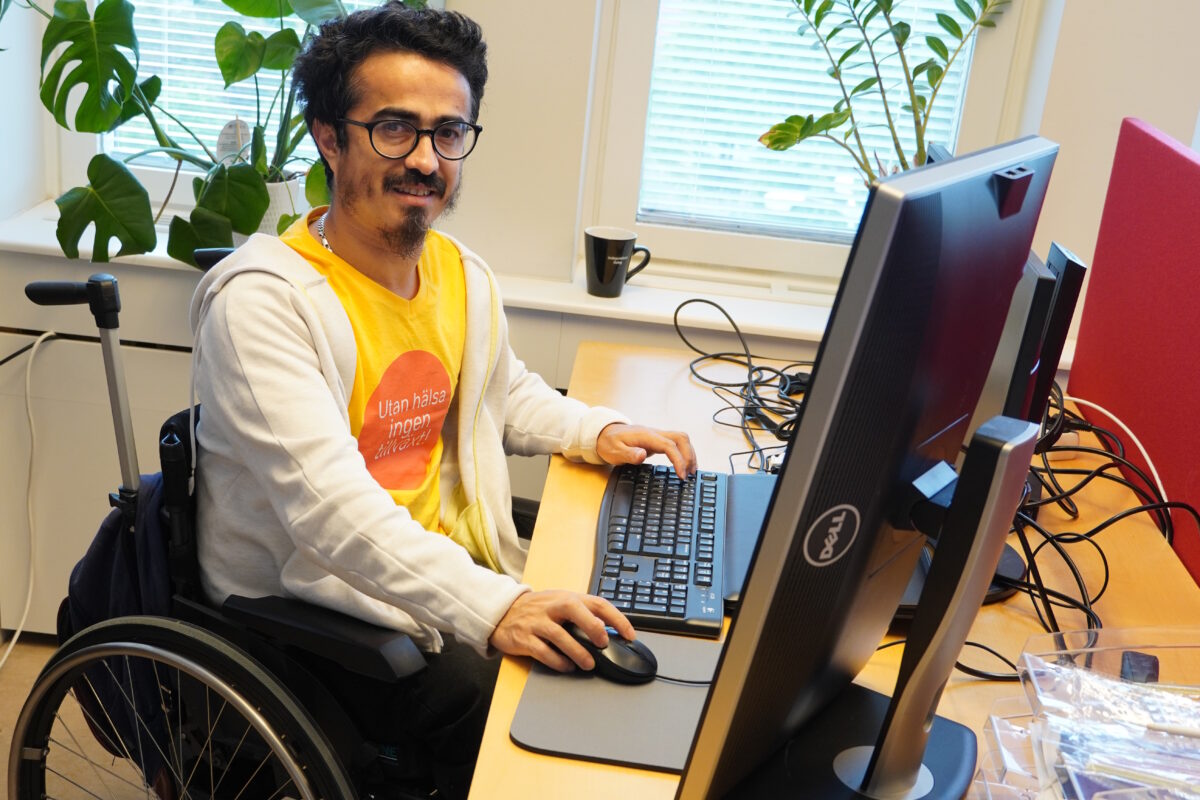It was the Swedish authorities who handled the evacuation of employees (mostly women) from the workplace where Ashraf Frugh’s sister worked. In this somewhat fortuitous way, Ashraf ended up in Sweden. That was almost two years ago and now he will work as a volunteer in the project Disabled Refugees Welcome – The right to work (DRW – RTA).
Life became difficult when the Taliban came and took over. Both Ashraf Frugh and his sister worked for international organisations, Ashraf himself at the International Committee of the Red Cross and his sister at the EU-supported organisation IDLO (International Development Law Organisation). Ashraf had also expressed criticism of the Taliban in his books. So there were good reasons for Ashraf and his sister to leave Kabul.
– It was the Swedish authorities who handled the evacuation of IDLO and they offered the employees to travel to Sweden and get asylum here. Since I was living with my sister, she informed them about me and they said “it’s okay, bring him”.
Did you know anything about Sweden before you came here?
“I knew it was close to the North Pole and it was very cold. I also knew about the Swedish Afghanistan Committee and that they helped many people, so I understood that it was a good country.
Large parts of his family remain in Afghanistan, including his mother, father and two of his brothers with their families.
“There are great difficulties, women are not allowed to work or be outdoors, girls are not allowed to go to school and the economy is poor. But they manage…” says Ashraf.
Got the chance to homeschool
Ashraf Frugh was born and raised in Kabul, Afghanistan. When he was 8 years old, he was hit in the back by shrapnel from a rocket and has been a wheelchair user ever since. For many in Afghanistan, it would have meant a very bad life; “having a disability in Afghanistan is extremely difficult,” says Ashraf.
“There was no support from any authorities at all. If you have a disability, you have to manage everything completely on your own. Accessibility to public areas is zero.”
But Ashraf was lucky and through ICRC Orthopaedic Center he got help and was given the opportunity to homeschool. A teacher came on regular visits and Ashraf was thus able to get a primary education and grades to get into university. At university, he studied English language and literature and eventually got a job at the Red Cross, including as an accountant and as a translator.
“It was the Red Cross that ran the Orthopaedic Center and they also had a social inclusion program that meant they only employed people with disabilities in those departments,” says Ashraf.
Aiming to become a teacher
Ashraf has lived in Sweden for almost two years, first in Huddinge and now in Botkyrka south of Stockholm. He has studied Swedish at SFI and applied for many jobs. He says that what he likes most about Sweden is the help and support you get as a person with disabilities in Sweden and that refugees are welcome here. But he has a hard time with the weather and the long or short days, depending on the seasons.
What jobs are you looking for here?
“The kind of job I had in Afghanistan. But I also have some experience of teaching, so my plan in the longer term is to study to become a teacher.”
By chance that he received information about DRW-RTA
It took a while before Ashraf heard about the project Disabled Refugees Welcome – The right to work. A Swedish journalist, Thord Eriksson, at the magazine Fokus and nationally known for his involvement in Afghanistan, was in the process of writing a book and needed to interview people from Afghanistan. Thord Eriksson in turn knew about DRW and thus tipped Ashraf off about us.
“He said that they work with migrants with disabilities and help them and then I went to the website and emailed, then Rahel called me.”
Author of three books
Before leaving Afghanistan, Ashraf Frugh had written and published three books. So far, they are only available in Persian.
“The first is like a biography, not really but almost, it is about life and what people with disabilities face in Afghanistan. The second is a collection of love letters and the third is a novel.” says Ashraf.
He is currently working on a fourth and fifth book and he is in contact with a publisher in Norway who is going to publish the books and also he is looking for someone who can translate and publish them in English and Swedish.
So when asked what his hobbies are, writing tops the list, but then he quickly adds:
“And find a job and get an income. And then I play wheelchair basketball and wheelchair table tennis. And I read a lot.”
Complicated systems
Another problem with Sweden could be said to be that things are complicated and that there is an inertia in the systems.
“It’s difficult to meet the right people and, for example, to get information about education. Just getting the transportation service took me a year”, he says and continues:
“It would be better if you got help faster. When a migrant comes to Sweden and registers with the Swedish Migration Agency, they should be informed about DRW-RTA during the interview. Had it not been for Thord telling me about DRW, I probably would not have known it existed” says Ashraf in conclusion.
